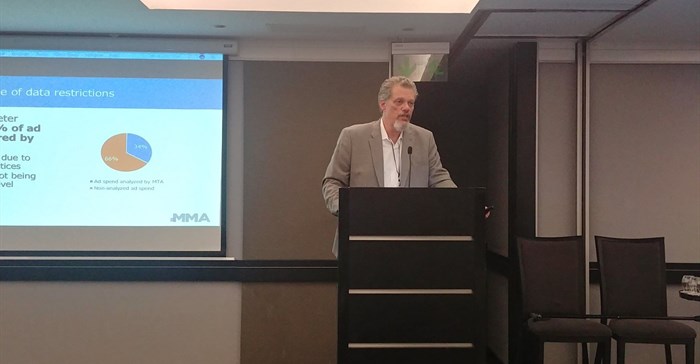Multi-touch attribution (MTA) is a different type of regression model that allows for shorter sales cycles, with truly engaged consumers and fewer more impactful marketing messages. However, while MTA offers potential - not perfection and will lead to growth - it is hard work.

MTA expert, Joel Rubinson at the MMA SA's recent Thought Leadership Event, The Future of Attribution.
The Mobile Marketing Association of SA’s (MMA SA) recent thought leadership event, The Future of Attribution, focused on MTA with guest speaker, Joel Rubinson.
Rubinson is the MMA’s MTA expert, an international keynote speaker and president of Joel Rubinson Partners Inc. He maintains that the benefits of MTA outweigh the hard work the model entails.
“Marketers can take steps to customise their messaging, to meet consumers on the right channel at the right time. The granular data offered by MTA enables this, helping marketers to identify audiences across channels and determine those users’ specific marketing desires, thereby improving the customer experience,” he explains.
MTA also helps marketers to achieve higher ROI for their marketing investments, illuminating where spend is most and least effective.
Linking ad serving information
Connecting ad serving information and conversation data at a user level is required.
At the heart of a successful MTA deployment is the ability to link ad serving information with user-level conversations to allow marketers to understand the value of customer touchpoints and actions. In turn, this leads to better and strategic media allocations to maximise engagements and future conversions. “By involving the user, it allows you to unpack the data by segment. MTA figures out what worked really well, letting you create successful advertising campaigns,” says Rubinson.
Rubinson took the audience through the “A Road Map for Marketers’ Success with multi-touch attribution (MTA)”, created by the MMA’s “Marketing Attribution Think Tank” (MATT), providing them with a visual map of the marketers’ journey from the stage of gaining familiarity to the stage of successful deployment.
The five stages of the MTA journey
MTA is a journey with five stages. The five stages include:
- Initiate MTA process
- Establish data readiness
- Set up first MTA project
- Implement first MTA project
- Deploy
Each stage has five pieces:
- Organise (people)
- Analytics (data)
- Skills of the organisation
- Media and data points
- Milestones that enables you to move on.
Rubinson explains that while the tools for each stage might be different, the puzzle pieces remain the same. “For example, the organisation/people dimension is always there, but it changes as you move through the stages.”
Linking data one of the biggest hurdles
Having someone to lead the project is also important, he adds.
MTA only works if you can connect the data from various sources. “Linking data is one of the biggest hurdles. People have data but linking them and connecting data assets is the problem,” he says.
"One of the challenges in South Africa is that data readiness is more difficult than in the United States (US) where there are numerous providers that will connect your data,” says Rubinson.
He advises against taking shortcuts regardless of the challenges you come up against. “Learn where you can, but most of the learnings should come from MTA,” he adds.
Despite the hard work involved with MTA, the success of the model is huge. Rubinson cites a case study where the MTA model was used to determine that one segment delivered 16 times the return on ad spend than another segment.







































